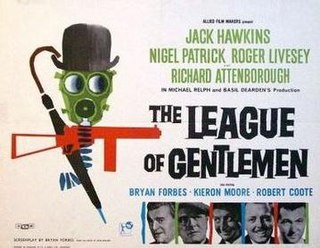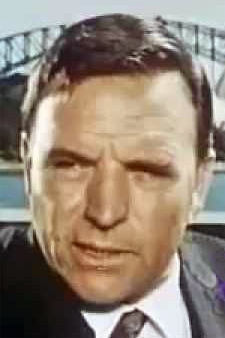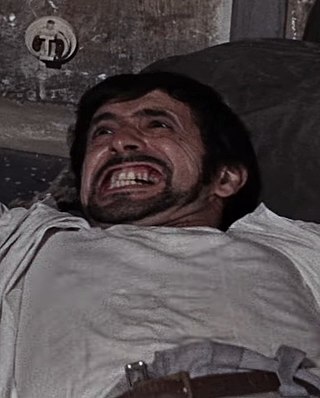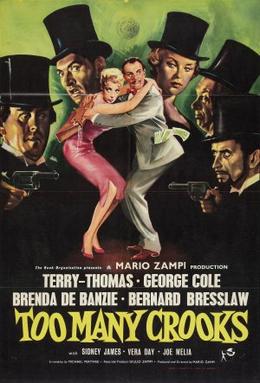
Two-Way Stretch, also known as Nothing Barred, is a 1960 British comedy film directed by Robert Day and starring Peter Sellers, Wilfrid Hyde-White, Lionel Jeffries and Bernard Cribbins. The screenplay is by Vivian Cox, John Warren and Len Heath. A group of prisoners plan to break out of jail, commit a robbery, and then break back into their jail again, thus giving them the perfect alibi – that they were behind bars when the robbery occurred. However, their plans are disrupted by the arrival of a strict new Chief Prison Officer.

The League of Gentlemen is a 1960 British heist action comedy film directed by Basil Dearden and starring Jack Hawkins, Nigel Patrick, Roger Livesey and Richard Attenborough. It is based on John Boland's 1958 novel of the same name, and features a screenplay written by Bryan Forbes, who also co-starred in the film.

Edward Sidney Devereaux, better known professionally as Ed Devereaux, was an Australian actor, director, and scriptwriter who lived in the United Kingdom for many years. He was best known for playing the part of Matt Hammond the head ranger in the Australian television series Skippy the Bush Kangaroo. He was also involved in the series behind the scenes, Devereaux writing the script and directing the episode The Veteran (1969), for which he received much critical acclaim. Devereaux based the story of the episode "Double Trouble" on an idea conceived by his children, wrote the screenplay of "Summer Storm" and the script for "The Mine". He also played the part of Joe in the Australian 1966 film They’re a Weird Mob. The film was a local success.

Graham William Stark was an English comedian, actor, writer and director.

Lionel Charles Jeffries was an English actor, director, and screenwriter. He appeared primarily in films and was nominated for a Golden Globe Award for his role in The Spy with a Cold Nose.

Basil Dignam was an English character actor.

Tutte Lemkow was a Norwegian actor and dancer, who played mostly villainous roles in British television and films. His chief claims to mainstream familiarity were his roles as the fiddler in the film version of Fiddler on the Roof and the old man ("Imam") who translates the inscription on the headpiece of the Staff of Ra for Indiana Jones in Raiders of the Lost Ark.

Robbery is a 1967 British crime film directed by Peter Yates and starring Stanley Baker, Joanna Pettet and James Booth. The story is a heavily fictionalised version of the 1963 Great Train Robbery. The film was produced by Stanley Baker and Michael Deeley, for Baker's company Oakhurst Productions.

The Pink Panther is a 1963 American comedy film directed by Blake Edwards and distributed by United Artists. It was written by Maurice Richlin and Blake Edwards. It is the first installment in The Pink Panther franchise. Its story follows inspector Jacques Clouseau as he travels from Rome to Cortina d'Ampezzo to catch a notorious jewel thief known as "The Phantom" before he is able to steal a priceless diamond known as "The Pink Panther". The film stars David Niven, Peter Sellers, Robert Wagner, Capucine and Claudia Cardinale.

Murder Ahoy! is the last of four Miss Marple films made by Metro-Goldwyn-Mayer that starred Margaret Rutherford. As in the previous three, Murder, She Said (1961), Murder at the Gallop (1963), Murder Most Foul (1964), the actress plays Agatha Christie's amateur sleuth Miss Jane Marple, with Charles 'Bud' Tingwell as (Chief) Inspector Craddock and Stringer Davis playing Mr. Stringer.

David William Frederick Lodge was an English character actor.

The Magic Christian is a 1969 British satirical farce black comedy film directed by Joseph McGrath and starring Peter Sellers and Ringo Starr, with appearances by John Cleese, Graham Chapman, Raquel Welch, Spike Milligan, Christopher Lee, Richard Attenborough and Roman Polanski. It was loosely adapted from the 1959 comic novel The Magic Christian by the American author Terry Southern, who co-wrote the screenplay adaptation with McGrath. The film also features pre-Monty Python appearances of John Cleese (credited) and an uncredited Graham Chapman, who had jointly written an earlier version of the film script. It also features an uncredited appearance by Yul Brynner performing “Mad About the Boy” as a drag artist.

Only Two Can Play is a 1962 British comedy film directed by Sidney Gilliat starring Peter Sellers, Mai Zetterling and Virginia Maskell. The screenplay was by Bryan Forbes, based on the 1955 novel That Uncertain Feeling by Kingsley Amis.

Gideon's Day is a 1958 police procedural crime film starring Jack Hawkins, Dianne Foster and Cyril Cusack. The film, which was directed by John Ford, was adapted from John Creasey's 1955 novel of the same title.

The Railway Children is a 1970 British family drama film based on the 1906 novel of the same name by E. Nesbit. The film was directed by Lionel Jeffries and stars Dinah Sheridan, Jenny Agutter, Sally Thomsett, Gary Warren and Bernard Cribbins in leading roles. The film was released to cinemas in the United Kingdom on 21 December 1970.

The Mouse on the Moon is a 1963 British comedy film, the sequel to The Mouse That Roared. It is an adaptation of the 1962 novel The Mouse on the Moon by Irish author Leonard Wibberley, and was directed by Richard Lester. In it, the people of the Duchy of Grand Fenwick, a microstate in Europe, attempt space flight using wine as a propellant. It satirises the space race, Cold War and politics.

Too Many Crooks is a 1959 British black comedy film directed by Mario Zampi and starring Terry-Thomas, George Cole, Brenda De Banzie, Sidney James, Bernard Bresslaw and Vera Day.

Never Let Go is a 1960 British thriller film directed by John Guillermin and starring Richard Todd, Peter Sellers and Elizabeth Sellars. It concerns a man's attempt to recover his stolen car.

Doctor in Distress is a 1963 British comedy film directed by Ralph Thomas and starring Dirk Bogarde, James Robertson Justice, and Samantha Eggar. It is the fifth of the seven films in the Doctor series. After a one-film absence, it was the final return to the role of Simon Sparrow by Dirk Bogarde, and also the return of Donald Houston. The film uses some of the characters in Richard Gordon's Doctor novels, but is not based on any of them.

Payroll is a 1961 British neo-noir crime thriller film directed by Sidney Hayers and starring Michael Craig, Françoise Prévost, and Billie Whitelaw. The screenplay by George Baxt was adapted from Derek Bickerton's 1959 novel of the same name. The film revolves around a group of criminals who plan and execute a wages robbery, which ultimately ends in disaster.




















